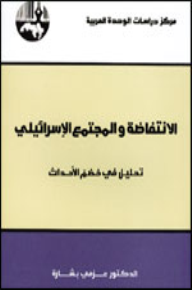Intifada and Israeli society
In this book, Arab thinker Azmi Bishara analyzes this historic turning point in the Palestinian national cause after the Al-Aqsa Intifada or the Independence Intifada of September 28, 2000, which represents the arrival of the settlement process through the Oslo agreement to a dead end, Palestinian conflict is a new phase of unprecedented armed and unprecedented armed confrontations and subsequent waves of martyrdom operations, the brutal Israeli repression of the Palestinian people and the Intifada, which amounted to the reoccupation of the Palestinian Authority areas and the destruction of the Palestinian infrastructure and institutional infrastructure. Ma'i and organized assassinations, isolating regions from each other and from the outside world.
Israel Since the assassination of Rabin to the election of Barak, its elections do not reflect the position of the Oslo Accords. The political consensus on the Palestinian issue at its current stage or the position of the so-called permanent solution is almost unanimous. The political situation, the location of the religious parties in the state, the origin of the voter and his affiliation (Eastern, Western, Russian, Moroccan, religious, secular).
There was great joy in half of Israeli society after the fall of Netanyahu in 1999, much more than after the fall of Shamir. Netanyahu has tried to bring about a radical reversal in the composition of the ruling Israeli elite. While Shamir only ruled and changed the policy in favor of the right, and freeze the peace process without affecting the Israeli governing institution. Netanyahu also came up with an ambitious program to change the existing elites from the Likud itself to the clash with the academic, cultural and judicial elites, in alliance with a marginal element in the Israeli establishment, such as religious parties and wealthy non-productive brokers working in the gray zone between legal and illegal.
Cultural and psychological factors may be more important in interpreting the changes taking place in Israel. The assassination of Rabin, for example, has had a major impact on Israeli society, and Netanyahu has left this wound open and bleak.
The Israeli elections revealed a series of new phenomena, such as: the decline in the popularity and influence of the traditional big parties, the growing strength of the Shas movement to become the third party in Israel after Labor and Likud, and the increase in the number of parliamentary blocs, ie political and electoral fragmentation and dispersion.
